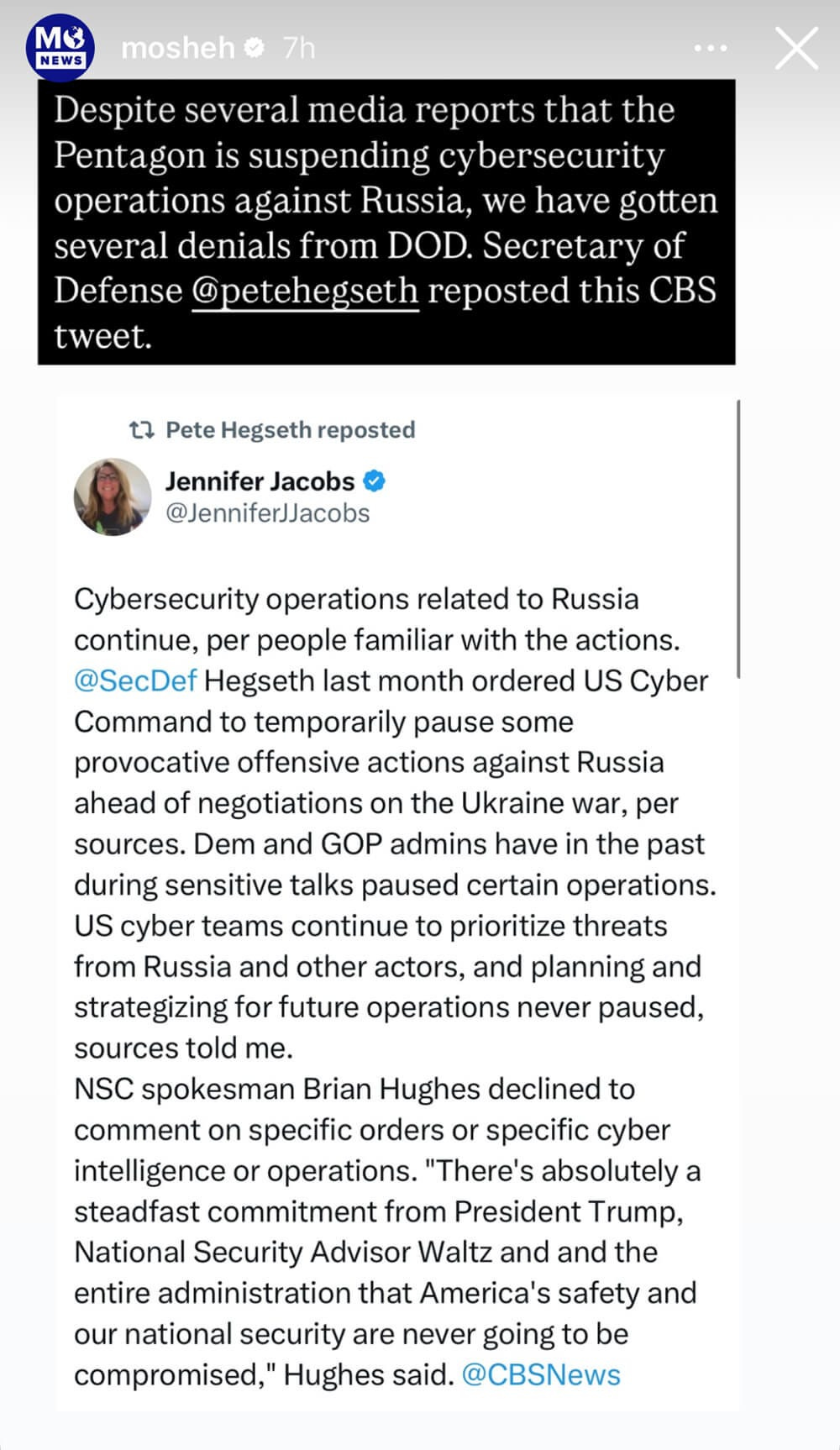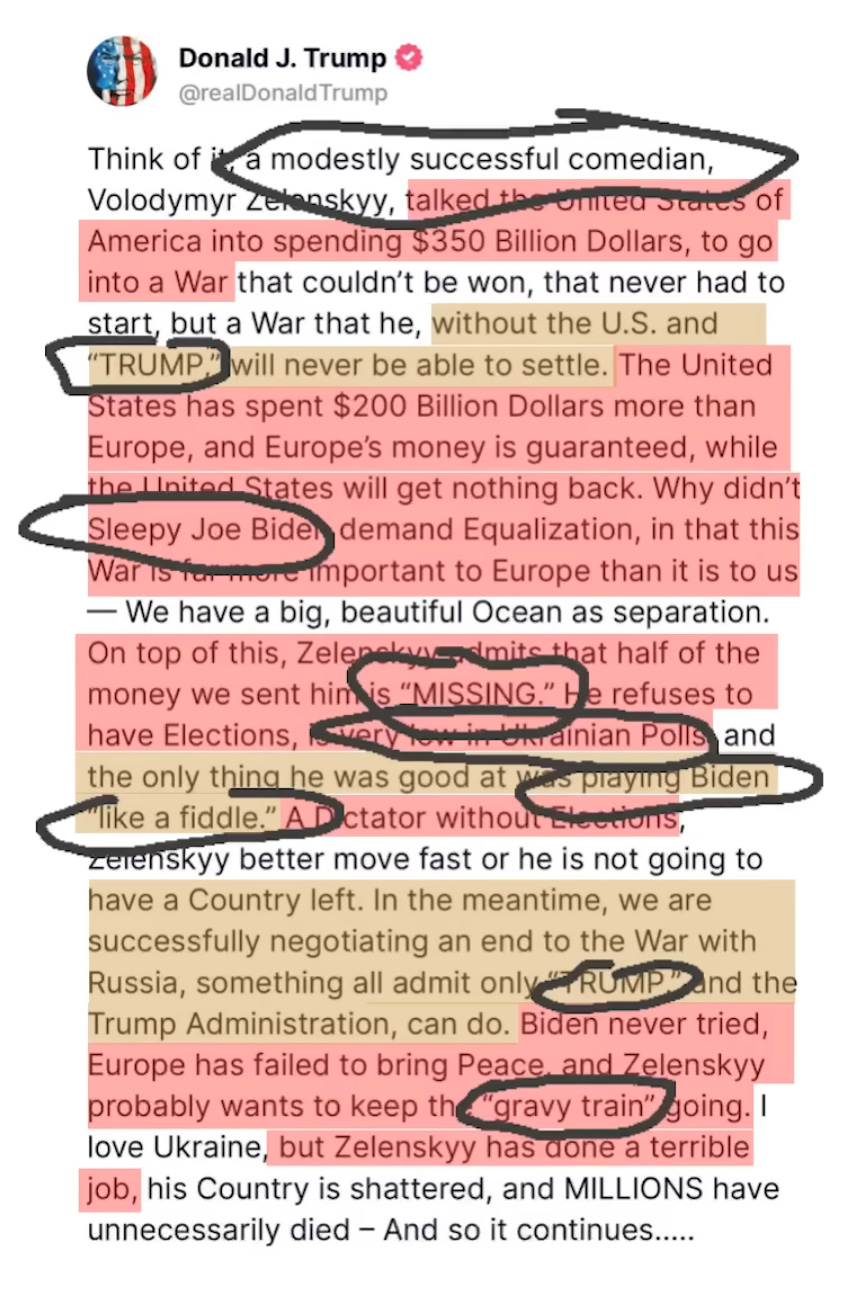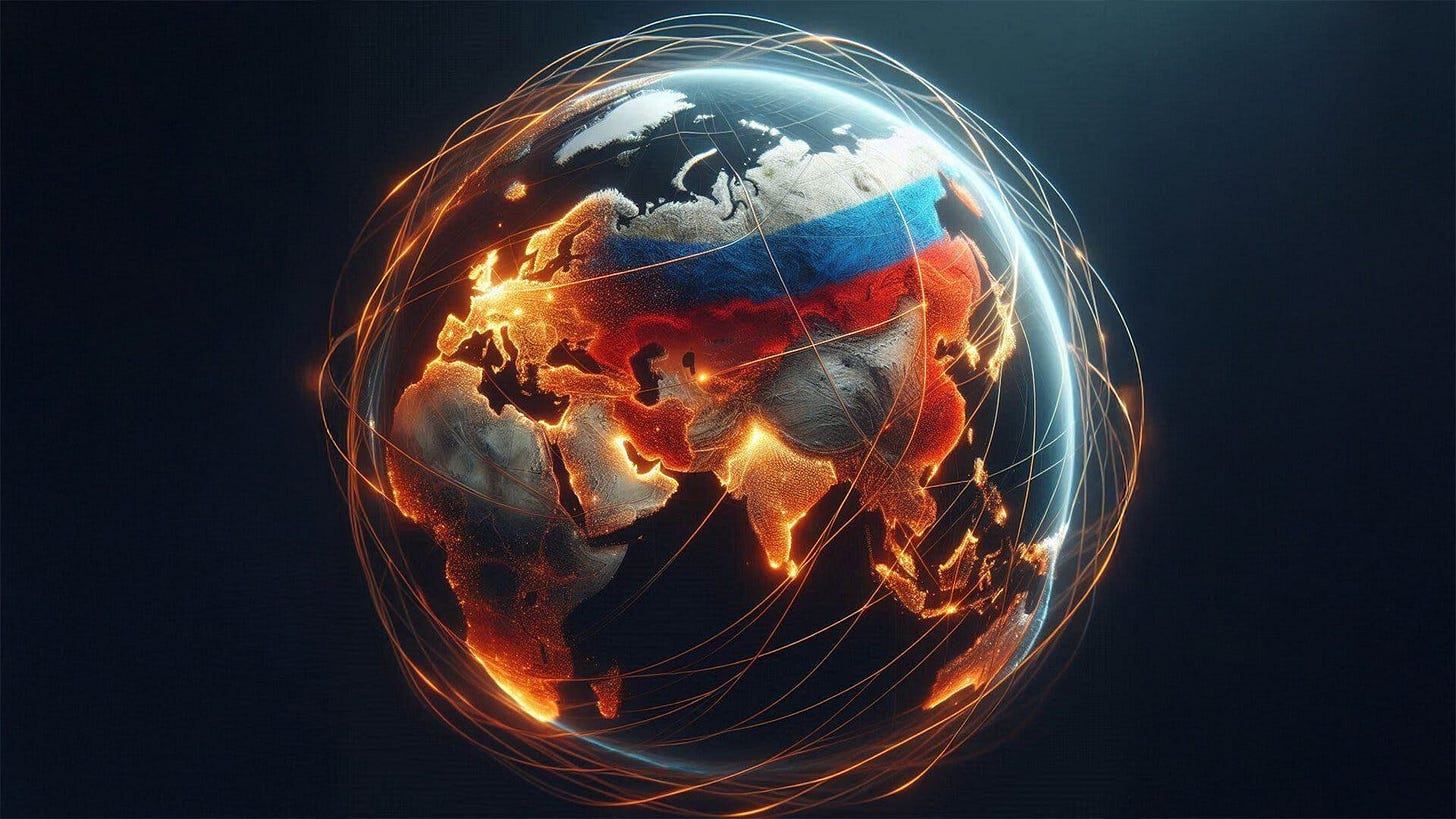The Geopolitics of WTF
Deciphering the fallout of the Zelensky-Trump meeting fiasco and the future of American foreign policy
Some six months after I returned home from Afghanistan, South Park creators Trey Parker and Matt Stone unleashed their cult classic comedy, Team America: World Police. I caught the 2004 commercials at my local gym and thought, “I have to see this.” The premise of the movie follows a squad of gung-ho super soldiers who battle terrorists and the North Korean dictator, Kim Jong Il. Oh, and all the actors are puppets.
Fresh from a war the movie mocked, I wasn’t sure what to expect, but I roared with laughter in the theater. Team America skewers American jingoism, Hollywood, and global foreign policy, with critics and fans alike widely embracing it.
By the time I arrived in Iraq in 2006, the movie had become a hit with the troops. To identify roads, American soldiers would rename them to ensure proper route clearance and uniformity when sending mission status over radio communication. We typically named streets after famous actresses or porn stars, but one street was an exception. Troops had named it “Bakalakadaka,” a nod to Team America’s parody of Arabic speech and a line ripped straight from the film. I could never keep a straight face anytime I heard, “We’ve got two military-aged males going north on Bakalakadaka Street.”
The movie spurred an interesting debate, however: should America be policing the world? Did we have the responsibility to protect everyone? At the time, Democrats and those opposed to the Iraq and Afghan Wars loudly proclaimed no. Chants of “No blood for oil” were commonplace, and many on the left were against the Bush administration’s foreign policy.
On the right, many hawkish Republicans felt it was America’s responsibility to secure the seas, enforce free trade, and make the world a safer place through the use of interventionist foreign policy. President George W. Bush branded Iraq, Iran, and North Korea the “Axis of Evil,” a label later stretched to include China and Russia. This mindset held firm for over a decade, with the Obama administration largely extending Bush’s overseas policies.
Looking back, it would appear that the two political parties have flipped their priorities and some of their ideologies, which has happened within the American political systems throughout our history. The Democrats, who once bemoaned American intervention, appear more hawkish than their Republican counterparts who have taken a strong isolationist and “America First” ideology. Blue-collar workers, long a Democratic stronghold, have even drifted right.
Consider the Ukraine War’s start in 2022, when Americans united in support of Ukraine against Russia’s unprovoked invasion. Time has since marched on, and the United States has sent $66.5 billion in aid. Yet some in political office and their constituents have soured on the war, mirroring our disillusionment with Iraq and Afghanistan. Those that were once hawkish are squeamish to commit troops to a war in another country with taxpayers bearing the burden. But the question Team America posed still looms: What is our responsibility?
Much of that depends on your personal viewpoints, but one thing cannot be overlooked: neglecting the lessons of history — its wars, its follies, its puppet-show absurdities — dooms us to stumble blindly, unable to heal a fractured world, and sets us up to ignore allies and treaties when we shouldn’t.
Mr. Zelensky goes to Washington
Recently, Ukrainian President Volodymyr Zelensky appeared at the White House to finalize a minerals deal with the United States. This would allow the US access to critical minerals, like lithium and titanium, through a reconstruction fund and split future profits evenly. The end goal was an increased United States presence to ward off future incursions by the Russians. The United States had also — apparently — been in talks with Russia about negotiating an end to the war.
To say things went poorly is an understatement.
In what has now become an internationally viewed clip, both Vice President JD Vance and President Donald Trump berated the Ukrainian President on live TV, which then descended into a shouting matching. Obviously, no deal was struck.
For the first forty minutes, talks hummed along until Zelensky posed a fair question: “What guarantees can there be for security and peace when Russian President Vladimir Putin has broken every agreement so far?”
For those who don’t know history, how you view this interaction might depend solely on your current feelings. For some, Zelensky was disrespectful and appeared to want more from the United States. But was his statement grounded in reality? Historically, Zelensky has quite the point because in 1994, the United States, Russia, and the United Kingdom came together along with Kazakhstan, Belarus, and Ukraine to sign the Budapest Memorandum. All three minor countries agreed to give up their nuclear weapons in exchange for specific guarantees, like respecting their sovereignty, borders, and not using economic coercion to pressure the countries. Perhaps the most defining agreement the countries made that applies to today is the following:
“Refrain from the threat or use of force against the territorial integrity or political independence of the signatories to the memorandum, and undertake that none of their weapons will ever be used against these countries, except in cases of self-defense or otherwise in accordance with the Charter of the United Nations.”
Beginning in 2014 with annexation of Crimea, Russia broke the treaty they signed. Then, with the invasion in 2022, they totally ignored the entire deal they’d struck, and Putin even hinted at using nuclear weapons. What was Putin’s justification for the invasion? There was a “neo-Nazi regime” in Ukraine.
In 2022, Americans found this laughable; “I stand behind Ukraine” messages quickly flooded social media profiles, and people across the United States hung Ukrainian flags on their homes. Veterans of the Iraq and Afghan Wars even made their way overseas to fight alongside the Ukrainian Army. The case seemed pretty clear Russia had violated their sovereignty and based upon the memo the United Kingdom and the United States signed, they now had a responsibility to protect an ally — via a proxy war, at least.
But Zelensky’s question about broken promises ignited Vance, who branded him ungrateful and disrespectful. They bickered over war’s toll and Vance admitted he’d seen only photos, not the front lines.
In one of the more scathing rebukes from Democrats in the aftermath, Massachusetts Representative Seth Moulton called out Vance as a “POG” and coward. For those not fluent in military lingo, POG (pronounced pogue) stands for “Person Other than Grunt.” Initially it was used to describe jobs outside of the infantry and combat arms, but morphed into those who hadn’t seen combat. It’s a highly offensive insult when said to another service member, and one I’d never thought I’d hear on TV. Moulton was a Marine infantry officer who served four tours in Iraq and earned two Bronze Stars (one with a valor device for heroism under fire) and a Navy and Marine Corps Commendation Medal (also with valor) for his actions overseas. Vance, on the other hand, was what is front-line troops commonly call a REMF (Rear Echelon Mother Fucker). These are the Marines and soldiers who stay inside their bases and have cushy jobs. Vance served during the Iraq War, but as a Public Affairs liaison.
I’m not one to disparage another veteran’s military service and think it’s petty, but why this tidbit matters is because Vance never saw front line combat, hence his comment about only seeing photos of the devastation. He would have no idea the destruction war brings about first hand, especially in regard to many of the war crimes committed by Russia. If you want my opinion on why Vance actually got upset with Zelensky and the meeting went off the rails, I think Vance viewed the comment as a slight on his military service.
Meanwhile, as the cameras rolled, everyone on the planet got to watch trade agreements reach a nuclear level meltdown between two allies.
Diplomacy and the geopolitics of Russia
“Russia should ‘introduce geopolitical disorder into internal American activity, encouraging all kinds of separatism and ethnic, social, and racial conflicts, actively supporting all dissident movements — extremist, racist, and sectarian groups, thus destabilizing internal political processes in the U.S. It would also make sense simultaneously to support isolationist tendencies in American politics’.”
—Aleksandr Dugin, The Foundations of Geopolitics: The Geopolitical Future of Russia (1997)
In the meeting’s aftermath, several reports came out about Russia’s media being present in the Oval Office and the US Cyber Command being told to scale down offensive cyber measures against Russia.
History, demography, economics, and foreign policy often shape our world and how we react to it. Yet, with the chaos coming out of the White House and swirling in the news, grasping what’s truly happening feels daunting — especially if you crave nuance and refuse to parrot a party line as an apologist or talking head.
In fairness — and a forthcoming critique — to the Trump administration, they’re likely trying to work out some semblance of a peace deal with the Russians. Diplomacy is an art and dance between two opposing forces, but Trump’s crew often swings it like a wrecking ball — sometimes effective, often foolish.
The reality is that Russia will not give back the land they’ve taken from the Ukrainians. Putin simply cannot allow this. This isn’t because he’s an autocratic dictator (which he is), but because Russia cannot survive without their former Soviet satellite states. As I’ve detailed in another analysis as to why Russia invaded Ukraine in the first place, they are edging closer and closer to a failed state. 1 in 10 Russians are over 65 and their workforce is in shambles, and they cannot replace workers due to declining birthrates. Russia also has skyrocketing levels of alcohol and substance abuse, a failing healthcare sector, declining life expectancy, and astronomical rates of HIV/AIDS and tuberculosis. Most of Russia is also a frozen tundra with non-arable land and cannot survive the future without the former Soviet states. It’s why they invaded Georgia in 2008 and annexed Crimea in 2014, only to fully invade Ukraine in 2022. Putin may be ruthless, but he’s not dumb and spent his years inside the KGB understanding the gravity of the situation. There is no way he’ll cede back any land to the Ukrainians, and someone inside the Trump administration is savvy enough to recognize this.
Cold War kids like me used to duck under desks for bomb drills, fearing Russian nukes. In modernity, I think we’ve forgotten the threat of nuclear annihilation, whereas the 1980s kept that existential dread alive. If Putin pushes the button, then US cities will vanish, launching a World War. We like to think we’ve become more civilized, but I contend we’re more barbaric with our drone strikes and advanced weaponry. That’s why Putin poses a real threat we must cautiously navigate, because if I were to guess who’d be the first to drop bombs, I’d put Russia, Iran, and China on the roulette board and let it ride.
That’s why there’s some truth but larger heartache in all of this — the war in Ukraine is nothing more than a war of attrition. It will only end if a deal is made, but Ukraine will lose territory, and we’re negotiating with a dictator capable of nuclear launch. It’s also why we paused offensive cyber measures against the Russians, which we’ve done before when negotiating with other countries.

The larger issue is that Trump is playing with fire by appeasing a dictator we lumped into the Axis of Evil and is now parroting Russian propaganda and disinformation. Geopolitical analyst and expert Peter Zeihan produced a video analysis showcasing a Truth Social post from Trump after Trump called Zelensky a dictator. Everything in red reflects Russian propaganda points they’ve pushed for the past three years during the Ukraine War, while the yellow marks fresh tactics. After Trump’s election win, the Russians shifted their approach to target him personally. The sections Zeihan circled pinpoint disinformation Trump has since woven into his own rhetoric.

The gold standard for espionage is getting the other side to act in your favor, convinced it’s their own brilliant idea — and that’s where we’re at. Unfortunately for the Russians, Trump’s a wild card, and changes his mind on-the-fly ad nauseam. When a reporter asked about him calling Zelensky a dictator, he shrugged, “Did I say that? I can’t believe I said that. Next question.” That’s the thing about Trump — there’s zero consistency and whatever he says one day might change the next, so for the next four years of his presidency, I don’t think anyone will be able to accurately predict the United States foreign policy, because it’ll change all the time. And that unpredictability sets the stage for a diplomatic trainwreck.
Make no mistake, how the White House handled the Zelensky meeting on national television was embarrassing. Post-9/11, Ukraine fought beside us in Afghanistan and abandoning them now reeks of hypocrisy. Zelensky rallied his nation and sought aid honorably, and Americans have died fighting beside the Ukrainians. But just like the Iraq and Afghan Wars, the Ukraine war isn’t on American minds unless it makes the news. We’re more worried about inflation and the rising cost of homes. It’s highly unlikely that after 20 years of war we want to commit troops on the ground once again and stoke nuclear fears. Europe isn’t going to step up either despite their rhetoric, as they’re already discussing peace deals in the aftermath of our failed meeting.
But that’s also the geopolitical problem I’m worried about more for the future, and Zelensky said it best — will Russia actually keep its word even if we strike a deal?
81% of Americans think Putin can’t be trusted, and I agree. As stated, Putin needs the former Soviet states so there will be further incursions. The long term impact isn’t even so much about Russia and land, because by violating treaties and refusing to protect allies it sets the precedent that every country should have their own nuclear arsenal because our agreements don’t mean a damn.
Which brings us back to the difficult question I suppose we as a country must answer — do we want to be Team America: World Police? Or do we let dictators run rampant burning down countries while we shrug, “Not our circus, not our puppets”?






I think Americans have answered this question despite the attempt to package it first in patriotism with Bush and later in liberalism with Obama and Biden. The American empire was created despite the wishes of the American people. The fact that Trump was elected is an exhibit that the American elites have also come to this view. The Ukrainian war failure and the technological ascent of China have spooked them and now it is time for retrenchment to the core. The distant provinces will be abandoned. The dream of a unipolar world is over.
Benjamin, your analysis is sharp, but the framing falls into a false binary: either the U.S. acts as "World Police" or retreats into isolationism. That ignores the real issue, which is that power vacuums don’t stay empty. When the U.S. steps back, it’s not peace that follows, but strategic opportunism from actors far more sophisticated than Russia’s blunt disinformation campaigns.
Look at Erdoğan’s Turkey. It has played both sides in Syria, deployed mercenaries in Libya, and turned NATO into a bargaining chip while cutting deals with Moscow and Washington. Or Qatar, which funds destabilizing movements under the guise of philanthropy while shaping global narratives through Al Jazeera. These states don’t just fill gaps left by U.S. disengagement; they exploit them with a level of finesse that makes Russian maskirovka look like amateur hour.
The real question isn’t whether the U.S. should intervene everywhere or pull back entirely. It’s how to prevent adversaries from filling the space with their own agendas. That requires deterrence, economic pressure, and coalition-building, not just an all-or-nothing approach.
Anyway, I need my morning coffee ☕